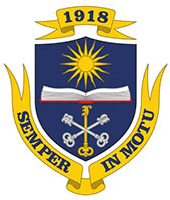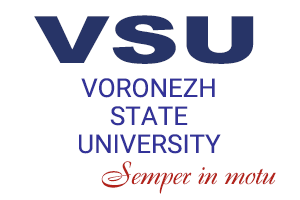On 14 December, a French delegation including the French Counsellor of International Economics, the president of the international commission MEDEF, Philippe Verbert, the director of MBA programmes, Charles Berger, and the manager of the Business Bridge project, Natalia Lanceraux, visited Voronezh State University. Among the participants of the meeting were also regional (Andrey Revkov) and municipal (Igor Lotkov) officials, representatives of the regional business community (GK Efko. AO KBKHA, OOO Lukoil-Chernozemienefteprodukt, TPP VO, OAO NIIPM, PAO VAKO, OAO Tyazhmekhpress, AO Kontsern Sozvezdiye, OOO Kosmos-neft-gaz, etc.), and young university researchers. The event was focused on three main topics: VSU's innovation potential, experience of prototyping optimum forms for cooperation between university and business, and the presentation of the unique master’s programme “Executive MBA”, created as a result of cooperation between the university and the Higher Institute of Commerce (Paris, France).
Dmitry Endovitsky: “We contribute to production!”
R&D is the foundation for the competitiveness and stability of any university. It takes about 50% of all activities conducted by a leading university. Universities do not only teach but also give practical knowledge in sciences. VSU's activities are also aimed at strengthening the innovative industries of the Russian economy. By offering support to this area the university has created a system of R&D advanced development and dynamic implementation of R&D projects.
Today, VSU is recognised as the innovation leader in the region. Before the official part of the meeting, the university researchers demonstrated their innovative projects to the guests: the rehabilitation system, Breath&Play, for children enduring pulmonary pathology; Glazodvig, an eye-tracking system, a water-retaining supersorbent called Solid Water; and high-performance emulsifiers based on oils and their processing waste.
A lot of attention was given to applied research projects implemented by VSU research teams in the framework of the Federal Target Programme "Research and development in top-priority areas of science and technology in Russia for 2015-2020". For example, “The development and enhancement of nuclear physical and X-ray diagnostic methods for nanomaterials” (supervised by E.P. Domashevskaya). The applied research project is conducted with financial support from the Ministry of Education and Science of the Russian Federation under Agreement № 14.574.21.0093 of 11 August 2014. Unique applied research identifier RFMEFI57414X0093. Another interesting project is “Development of a new technology and equipment for synthesizing nano-scale magnesian powders from recycled waste of enriched amorphous magnesite production” (supervised by V.F. Selemenev). The applied research project is conducted under financial support of the Ministry of Education and Science of the Russian Federation under Agreement № 14.577.21.0111 of 22 September 2014. Unique applied research identifier RFMEFI57714X0111.
These projects constitute just a small part of the long list of the university’s latest R&D projects.
“In the last five years, we have developed a system for the commercialisation of our innovative R&D projects. The chain “fundamental research – applied research – innovative project – introduction of the project into production” has been working quite efficiently. We were also able to implement a few large hi-tech production projects. All in all, we were able to create various types of production methods and introduce technologies which were developed by the university for the market-driven economy. The total financing, including state subsidies, co-financing by our business partners, and the university funding, reached 1 billion 200 million roubles. “We contribute to production!” – said the rector of the university, Dmitry Endovitsky.
The university is determined to move further ahead and is actively introducing its projects into production. In some cases R&D projects have given place to projects which involve research, development, design, and testing. Thanks to the efficiency of the researchers and the system for commercialisation of innovative projects, in 2015, VSU was recognised as the best innovative university in the Voronezh region. Four out of five winning projects belong to Voronezh State University.
“Innovation is not an option, it is an indispensable prerequisite for the survival of an enterprise.”
Today, it is impossible to imagine a successful university that lacks active cooperation with businesses. VSU is involved in active cooperation with regional hi-tech industrial enterprises, it successfully implements projects within the framework of the Decree of the Russian Government № 218 (in collaboration with OOO Voronezhselmash, OOO FPK Kosmos-Neft-Gaz, OAO Efko, OOO VMP) and projects within the federal target programme "Research and development”.
“Total financing of projects in 2013–2016 is over 1.2 billion roubles, and the total amount of federal subsidies is about 700 million roubles. This is the highest rate among Voronezh universities and one of the best in the Central Black Earth region,” said vice-rector for Innovations and Technology Commercialization, Tatiana Davydenko.
One of the best examples of successful collaboration between the university and businesses is cooperation with the Efko group of companies. The cooperation covers two main areas: R&D and personnel training. In 2014, the Efko group of companies opened the Fundamental Department of Natural Compounds Chemistry in Voronezh State University. Today, the department offers the master’s programme “Natural Compounds Chemistry”. It also implements programmes in recycling plant raw materials, quality control, research into the physical and chemical methods of natural compounds, and polymer physics and chemistry.
“A project, which was implemented in cooperation with Efko and which has been successful in all aspects, is “Developing a hi-tech industry for plant oil and fibre processing and transformation into non-food products”. A project dedicated to the development of energy-saving technologies used in the process of the production of emulsifiers is currently being implemented. Additionally, we pay a lot of attention to personnel training. Our company offers internships, training, and specialised courses for students and university staff. We provide our students with the opportunity to use the most modern equipment,” said Tatiana Sanina, the general director of Biruch-NT Innovation Centre.
Philippe Verbert noted that VSU had made a breakthrough in the area of cooperation with businesses. He also emphasised that today in France the National Business Union is trying to make the “research – production” chain function efficiently.
“At this stage of economic development, innovation is not an option, it is an indispensable prerequisite for the survival of an enterprise. This process needs a lot of contribution from the government and a special regulatory framework,” said Philippe Verbert.
The French Counsellor also told the participants about the support offered to young innovators in France, tax preferences, and business angels that should create the most favourable conditions for cooperation between researchers and businesses.
“We have to offer such a system of professional development for young specialists that will make it possible for them to totally fulfil the market requirements,” said Mr Verbert.
The unique double degree programme “Executive MBA”
The key point of the meeting was the presentation of the double degree programme “Executive MBA”.
The history of MBA programme development in Russia shows that businesses are interested in competent employees. A large amount of specialists from various industries have gone into business (especially small businesses). They are gaining experience and knowledge in economics and management. Voronezh State University launched an MBA programme in 1995 when it was implementing a regional Tacis project. It was a result of the university’s efforts within a consortium of European universities (Ireland, Holland, and Denmark) which were aimed at creating a university business school.
In 2016, VSU opened the double degree programme “Executive MBA” in cooperation with the Higher Institute of Commerce (Paris, France). The programme is unique, because it will be implemented by the lecturers of the VSU's Business School that were delegated with the right to implement the joint academic programme. The lecturers of the centre have been accredited by the Higher Institute of Commerce of Paris that is an accredited member of the international accreditation agency AACSB.
Charles Berger, the director of the MBA programmes:
“Our programme is for senior management and other specialists with management experience. Its duration is one year, including 6 months of in-class learning and 6 months of practical training at an enterprise. Moreover, the curriculum is determined according to the needs of organisations and is based on national and international experience. The programme is in Russian. Our graduates receive two degrees: a degree from VSU business school and a degree from the Higher Institute of Commerce of Paris.
Charles Berger emphasised that this is the only programme of such quality implemented in Russian.
The event was concluded by the rector of VSU, Dmitry Endovitsky, who quoted the words of a Chinese philosopher, Confucius:
“A wise man said: “There are three things in life that once gone, may never come back – Time, Words & Opportunity.” Dear colleagues, I am sure that the people in this hall don’t waste words, value their time, and never miss an opportunity. Thank you for the fruitful and productive discussion!”
























